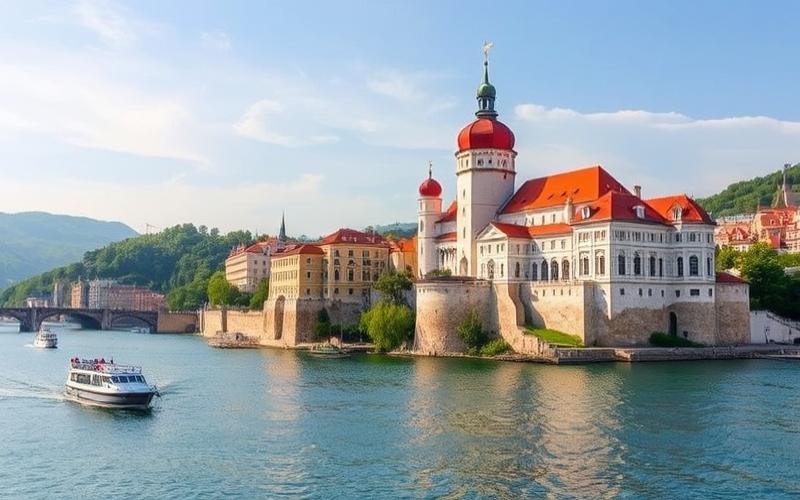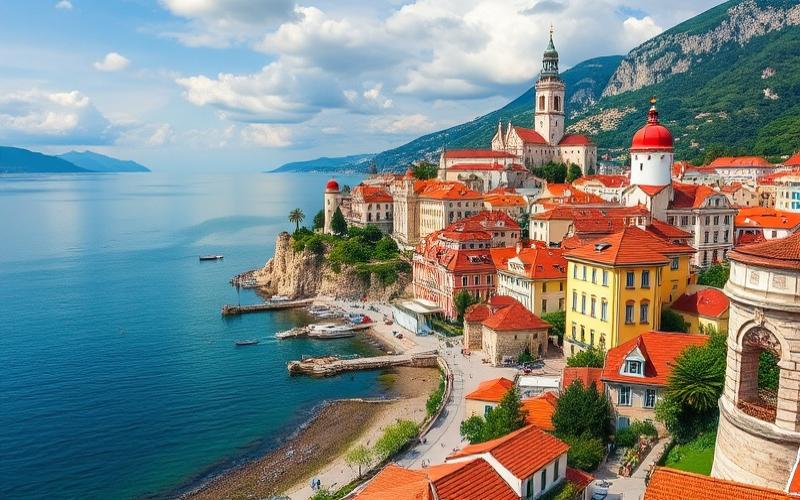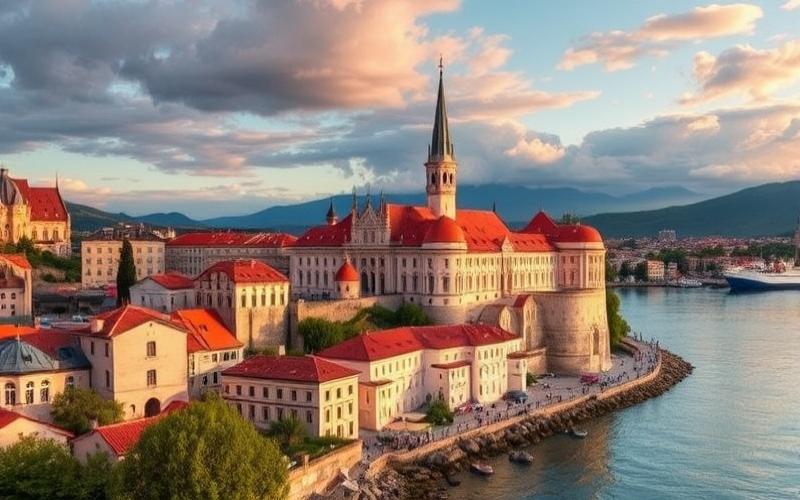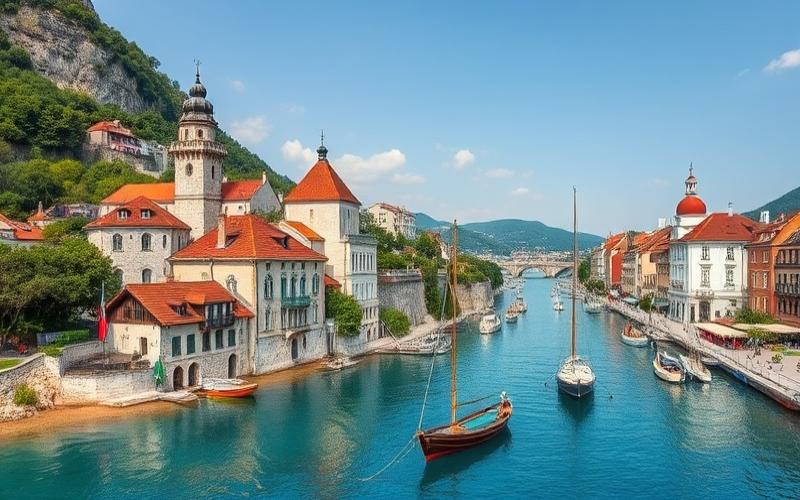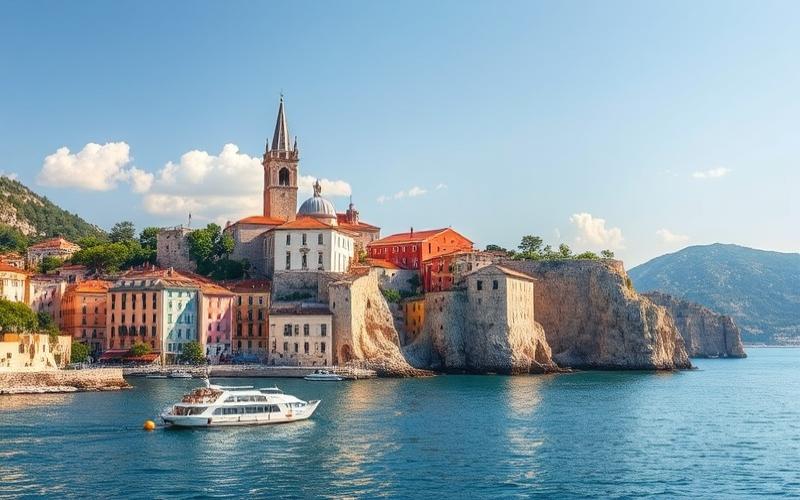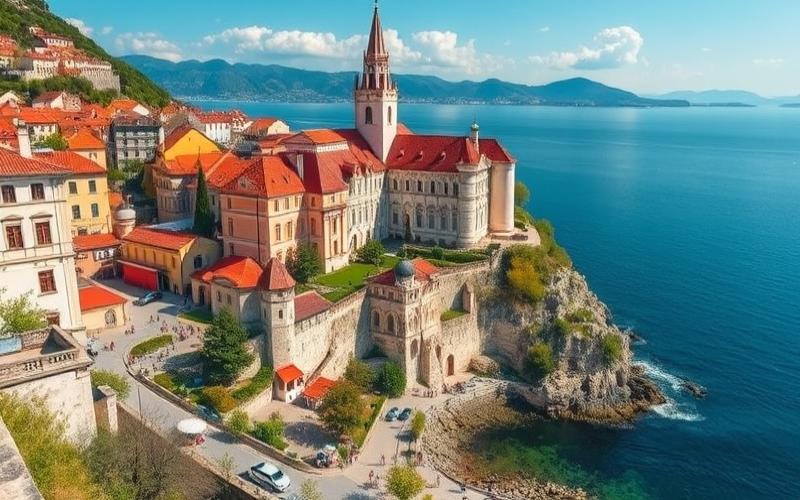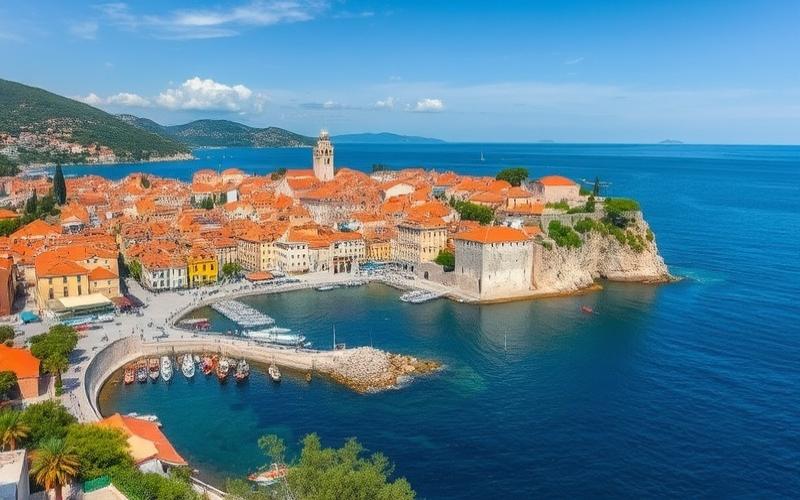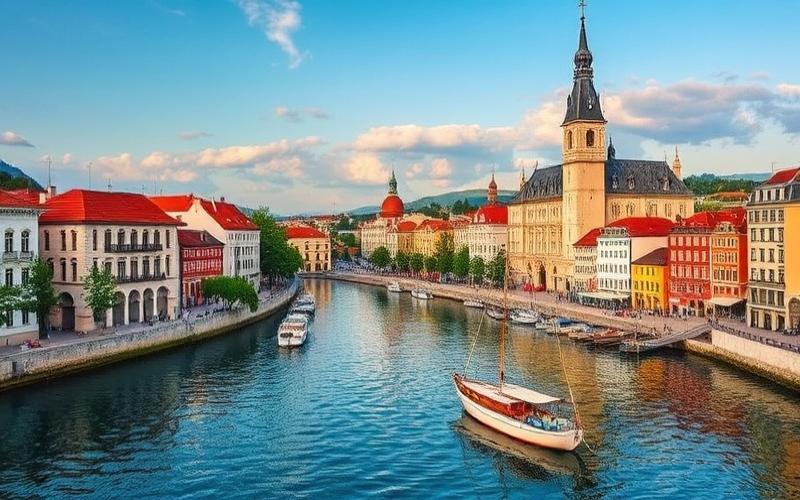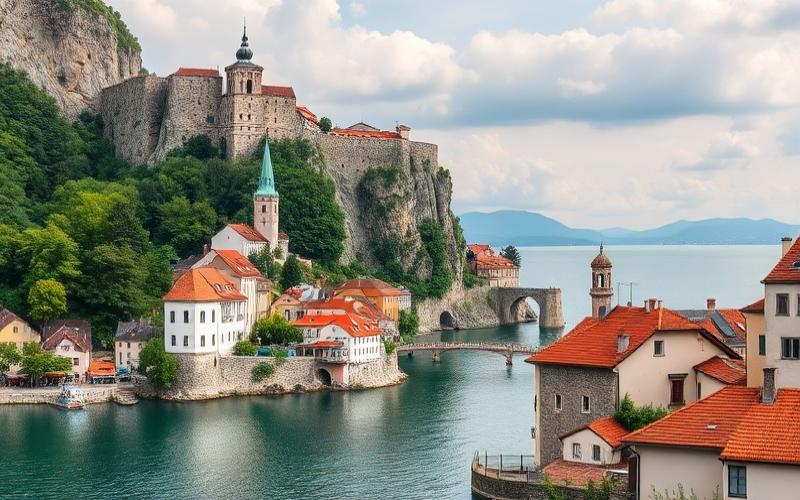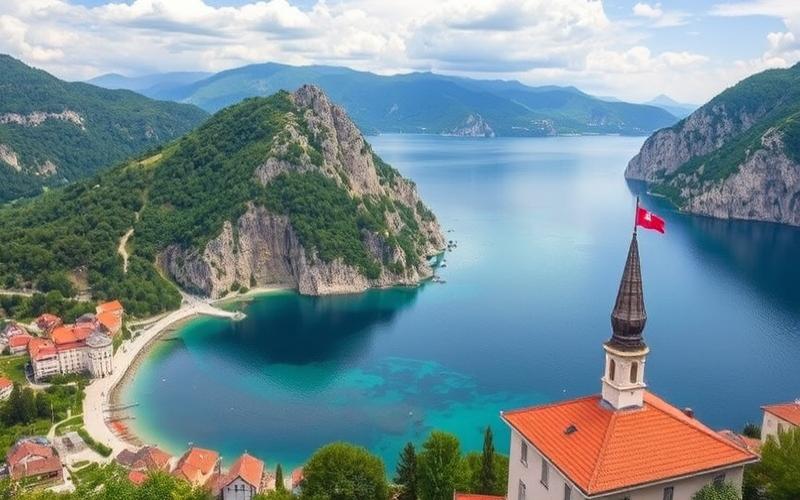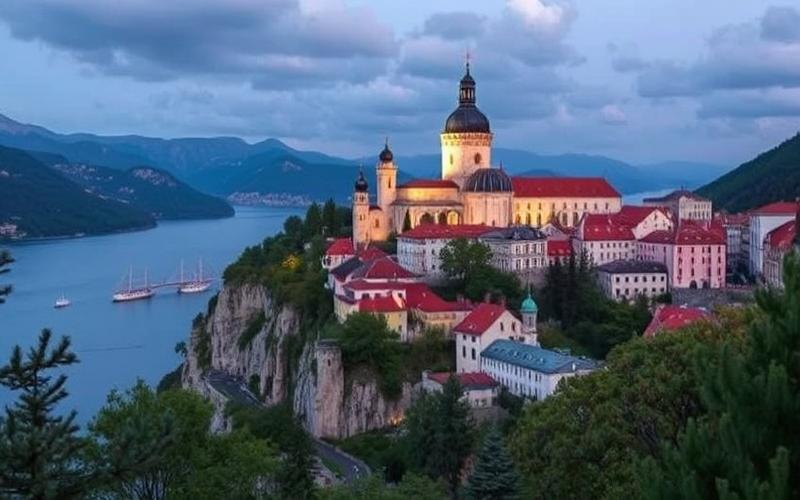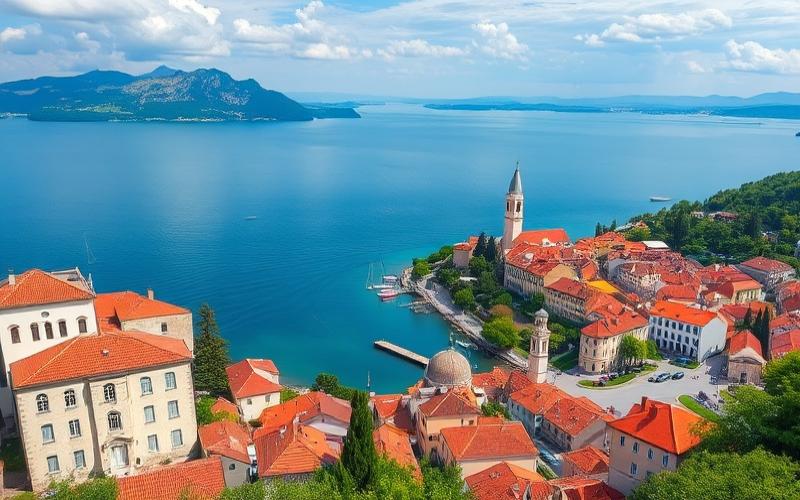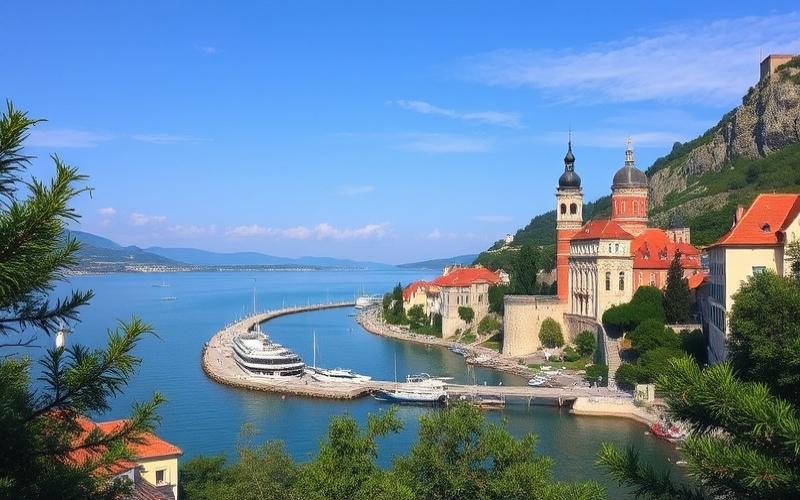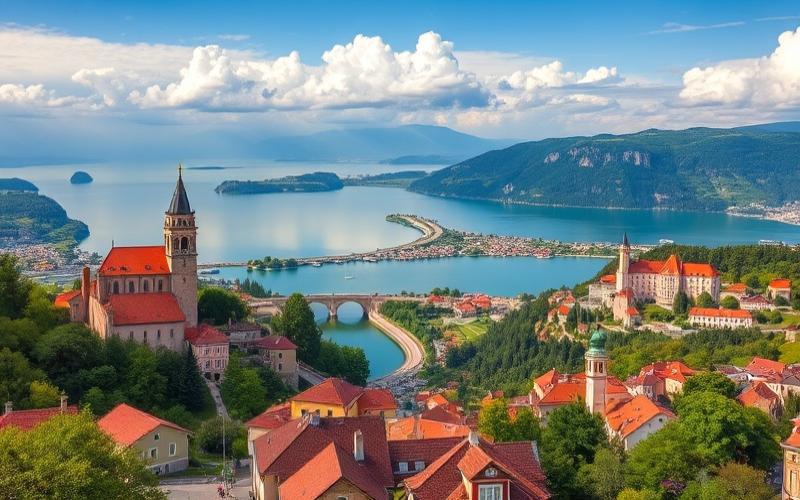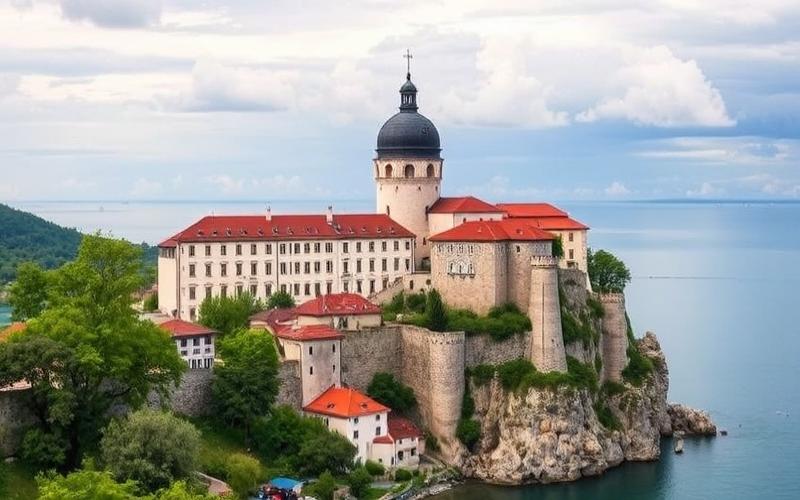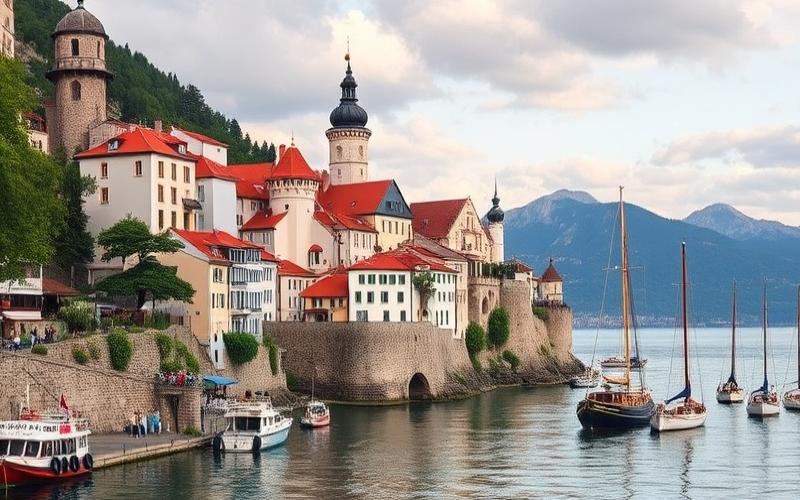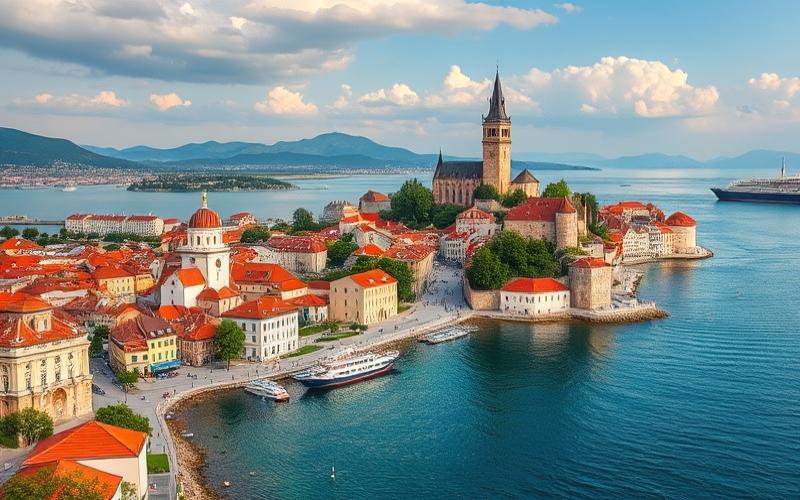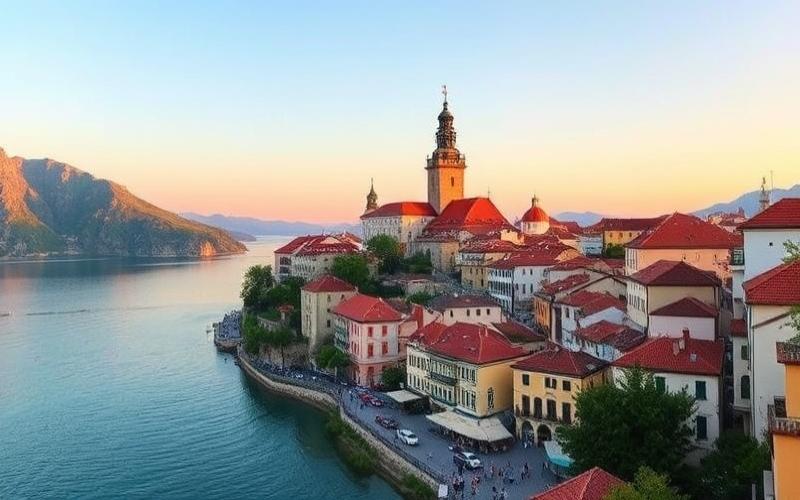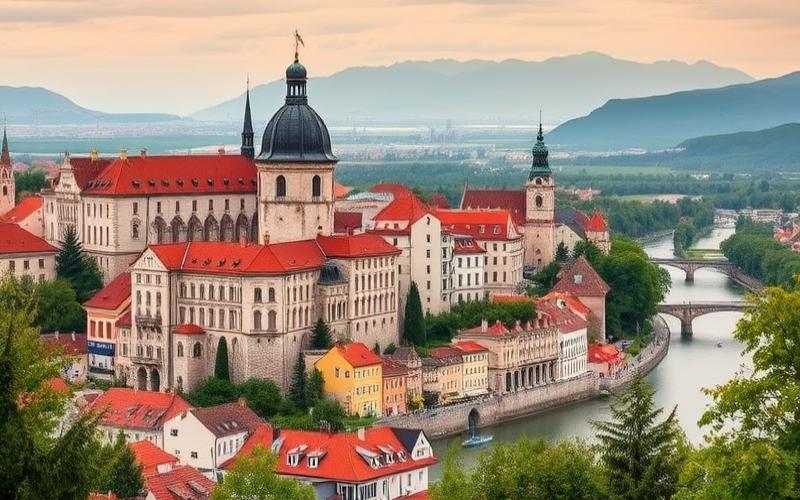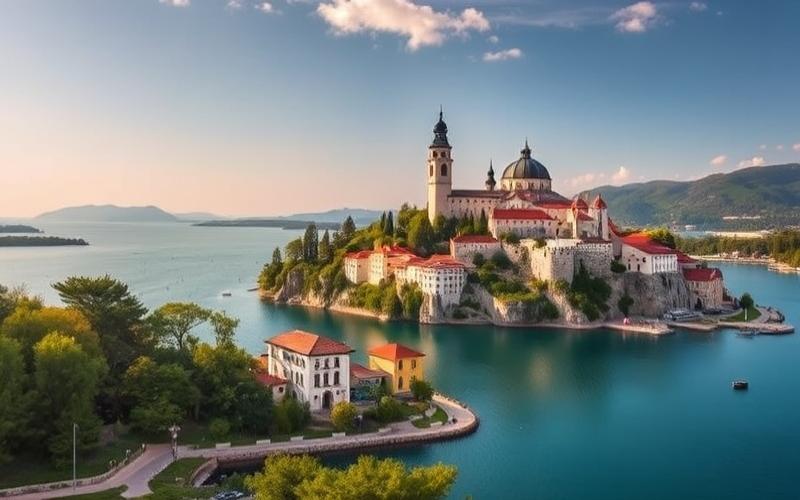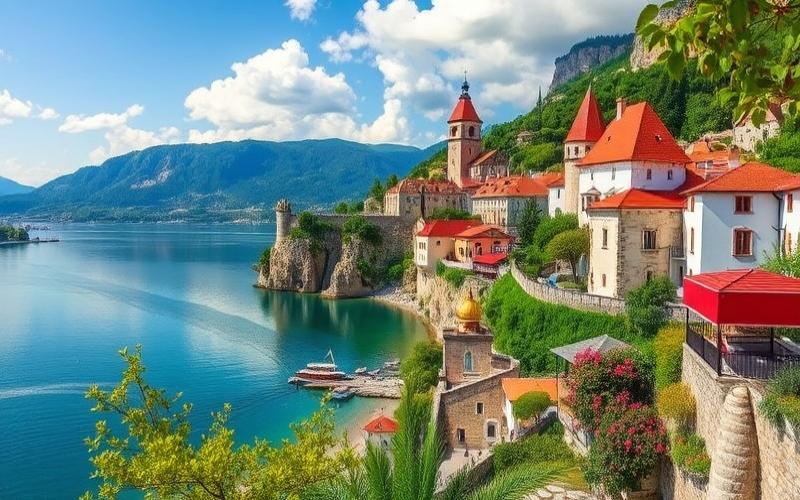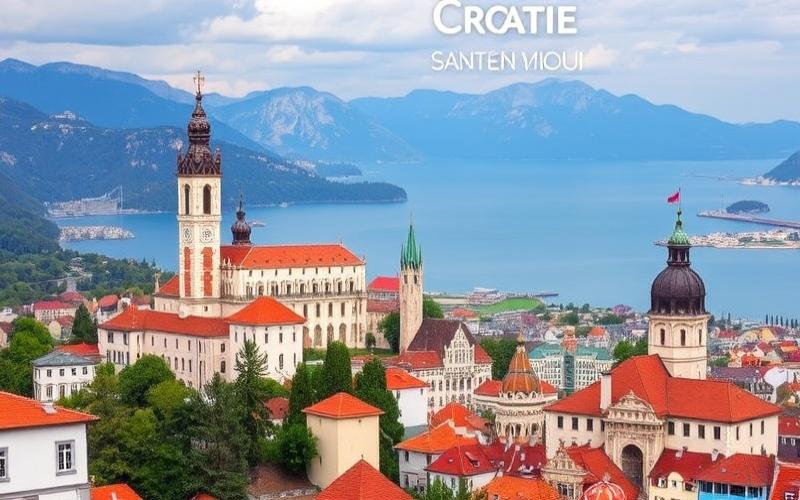
 Published on and written by Cyril Jarnias
Published on and written by Cyril Jarnias
Moving to Croatia, with its cultural richness and breathtaking landscapes, is an enticing adventure, but it also requires adapting to the region’s climatic specificities.
This enchanting country, stretching from the peaks of the Dinaric Alps to the idyllic shores of the Adriatic, features a variety of microclimates, ranging from continental to Mediterranean.
Understanding these specific climatic nuances is essential for living comfortably and fully enjoying the natural wonders Croatia offers.
This article provides practical tips to help expatriates make the most of the seasons while minimizing potential climate discomforts.
Adapting to the Croatian Climate: Understanding Local Specifics
Croatia stands out for its highly varied climate, influenced by its geography, with a clear contrast between the Adriatic coast and the continental interior.
| Region | Climate Type | Average Winter Temperatures | Average Summer Temperatures | Precipitation | Specifics |
|---|---|---|---|---|---|
| Adriatic Coast (Split, Dubrovnik, islands) | Mediterranean | 6-10°C | 26-30°C | 800-1200 mm/year, mainly in winter | Hot, dry summers; mild, wet winters; high sunshine (2600-2700 hours/year) |
| Interior (Zagreb, Slavonia) | Temperate Continental | -2 to 2°C | 20-22°C | 800-1000 mm/year, summer thunderstorms | Cold, snowy winters (25-60 snow days/year); large temperature ranges |
| Mountain (Gorski Kotar) | Mountain | -5°C | 25°C | Heavy rain, snow | Cool summers, harsh winters |
Notable Regional Differences:
On the coast, the Mediterranean climate brings long, hot, dry summers and mild, wet winters. The sea temperature reaches 25-26°C in summer, making swimming possible from May to October.
In the interior, the continental climate is characterized by cold, sometimes snowy winters and warm summers that are shorter. Temperature variations are more pronounced than on the coast.
Main Climate Challenges for Expatriates:
- High humidity on the coast, especially in winter, which can cause condensation in homes.
- Strong winds like the bura (cold, dry, from the northeast, can last 3 days) and the jugo/sirocco (warm, humid, from the south), which strongly affect the perceived temperature and can disrupt travel or daily life.
- Summer thunderstorms frequent in the interior, sometimes oppressive heat in summer.
Practical Tips for Adaptation:
Preparing Your Home:
- On the coast, prioritize good insulation against humidity and plan for supplemental heating in winter.
- In the interior, ensure the home is well-heated and insulated to handle winter frost.
- Install shutters or blinds to limit summer heat and protect against wind gusts.
Clothing to Bring:
- Coast: Light clothing, hats, sunglasses, swimsuits for summer; sweaters, windbreakers, raincoats for winter and transitional seasons.
- Interior: Warm jackets, coats, hats, and gloves for winter; breathable clothing for summer.
- Shoes suitable for rain and snow depending on the region.
Local Activities by Season:
- Summer: Swimming, water sports, outdoor festivals, island hiking.
- Autumn: Grape harvests, harvest festivals, exploring national parks.
- Winter: Christmas markets, winter sports in mountain regions, indoor cultural events.
- Spring: Hiking, nature observation, music and folklore festivals.
Role of Seasons in Cultural Events:
Summer is the season for festivals (music, theater, folklore), local celebrations, and seaside markets.
Winter is marked by traditions like Christmas markets, carnivals, evening gatherings, and winter cuisine (stews, mulled wine).
The climate directly influences the pace of life: social life intensifies in summer, while winter fosters indoor conviviality and snow sports in the mountains.
The Croatian climate, alternating between Mediterranean mildness and continental rigor, profoundly shapes lifestyles, housing, event schedules, and activities throughout the year.
Good to Know:
Expatriates in Croatia must prepare for the threatening bura wind in winter and high humidity on the coast in summer, adapting their homes with good insulation and clothing suited to changing conditions. Enjoy the local festivals that mark the year, but be ready for cultural and climatic differences between Mediterranean and continental regions.
Prevention and Adaptation Strategies for Extreme Climates
Croatia exhibits great climatic diversity, oscillating between a Mediterranean climate on the Adriatic coast and a continental climate inland. Summers are hot and dry, with temperatures reaching or exceeding 35°C on the coast and up to 37/38°C during heatwaves in the continental plains. Winters are mild and wet on the coast (around 10°C), but colder in the north and center of the country, where snow is frequent and temperatures can drop below zero. The region is exposed to specific climate phenomena like the bora (cold, dry, violent wind, especially in winter on the coast) and the sirocco (warm, humid wind that can precede storms in summer or autumn). Summer thunderstorms are frequent in continental regions, while the coast can experience heavy rain episodes in autumn.
Practical Tips for Expatriates:
Home Adaptation
- Reinforce thermal insulation (doors, windows, roofs) to better withstand temperature extremes.
- Install shutters, blinds, or thick curtains to limit heat penetration in summer.
- Ensure good natural or mechanical ventilation, especially in older downtown apartments.
- Use air conditioning moderately and favor fans to avoid high energy consumption.
Water Management
- Always have a supply of drinking water, especially during heatwaves or droughts.
- Install a rainwater harvesting system for non-potable uses (watering, cleaning).
- Be aware of any local restrictions during summer periods.
Suitable Clothing
- Prefer light, loose clothing made from natural fibers (cotton, linen).
- Wear a wide-brimmed hat and sunglasses.
- Use appropriate shoes to limit sweating and protect from hot surfaces.
Preventive Health Measures:
- Drink regularly, even if not thirsty, and avoid alcohol or very sugary drinks.
- Eat light meals rich in hydrating fruits and vegetables.
- Protect yourself from the sun between 12 PM and 5 PM: seek shade, limit intense physical activities.
- Use high-SPF sunscreen, reapply every two hours.
- Be attentive to signs of dehydration (fatigue, headache, dizziness, dry mouth) or heatstroke (nausea, fever, confusion).
- Adjust outings during weather alerts (storms, strong winds), stay sheltered, and avoid isolated trees or flood-prone areas.
Local Initiatives and Awareness Programs:
- Public campaigns inform about risks related to heat and storms, with messages broadcast on radio, TV, or social media.
- Municipalities set up cool spaces accessible to the public during heatwaves (libraries, air-conditioned community centers).
- Awareness workshops on water management and energy consumption reduction are offered in residential neighborhoods.
Useful Local Resources:
| Service | Description | Access |
|---|---|---|
| Meteo Croatia | Detailed forecasts, heatwave/storm alerts | Website, app |
| HZJZ (Public Health) | Health advice, health alerts | Website |
| Municipalities | Emergency plans, water distribution points | Local postings |
| Local Radio | Immediate information on extreme phenomena | FM, web |
Examples of Local Adaptation:
- Coastal city residents systematically close shutters and windows early in the day to preserve indoor coolness.
- Outdoor activities (markets, farm work, sports) are moved to early morning or late afternoon.
- Public fountains are used for cooling, and shaded parks become meeting spots.
- Expatriates can draw inspiration from these practices, adopting adapted lifestyles and participating in community initiatives for climate risk management.
In Summary:
Croatia requires particular vigilance against climate extremes. Adapting the home, thoughtful water management, cautious behavior, and attention to health allow for navigating difficult periods, relying on local experience and available resources.
Good to Know:
In Croatia, summers can be extremely hot with heatwave risks, necessitating measures like home insulation and wearing light clothing to avoid dehydration; local programs promote strategic use of natural ventilation, supported by regular alerts from meteorological services.
Home Setup and Equipment for Successful Acclimatization
The Croatian climate is distinguished by great regional diversity. The Adriatic coast enjoys a Mediterranean climate characterized by hot, dry summers (up to 30–35°C) and mild, rainy winters (6–10°C). Inland, particularly around Zagreb and in Slavonia, the climate is continental with cold winters (0 to –2°C, frequent snow) and warm summers (20–26°C) marked by thunderstorms. Mountain regions have a harsher climate, with winters reaching –5°C and moderate summers. This diversity implies home setup needs adapted to the region of residence.
Preparing Your Home According to Croatian Seasons
- Winter (December to February):
- Coast: prioritize good moisture sealing and supplemental heating solutions.
- Interior: reinforce insulation (windows, doors, walls), install efficient heating systems (stoves, electric or gas radiators).
- Mountain: plan for powerful heating and reinforced insulation.
- Summer (June to August):
- Coast: install cooling solutions (air conditioning, fans), favor natural ventilation with shutters and curtains.
- Interior: plan ventilation to limit overheating, use thermal blinds.
- Mountain: generally, nighttime coolness is sufficient, but plan occasional cooling solutions during heatwaves.
- Transitional Seasons:
- Adapt ventilation to avoid humidity (spring, autumn), especially on the coast.
- Control indoor humidity with dehumidifiers if necessary.
Essential Equipment for Optimal Comfort
| Region | Heating | Cooling | Humidity Control |
|---|---|---|---|
| Coast | Supplemental heating | Air conditioning, fan | Dehumidifier |
| Interior | Stove, radiators | Ventilation, A/C | Humidifier in winter |
| Mountain | Central heating | Air cooler | Humidifier/dehumidifier |
- Prefer reversible air conditioning systems (heat/cool) for year-round adaptation.
- Dehumidifiers are recommended on the coast to combat winter humidity, while the interior may require a humidifier during dry winters.
Suitable Furnishings and Textiles
- Thermoregulating textiles: insulating curtains, thick rugs for winter; light, breathable bed linens for summer.
- Furniture: prefer materials resistant to temperature variations (solid wood, treated metal) and avoid fabrics sensitive to humidity on the coast.
- Accessories: use cushions, blankets, and throws made from natural fibers to easily adapt to seasonal changes.
Eco-Friendly Tips and Energy Standards
- Opt for double-glazed windows, natural insulation (wood wool, hemp), and A+++ labeled equipment for air conditioning and heating.
- Prefer local materials from sustainably managed forests and eco-friendly paints.
- Refer to Croatian energy standards: many appliances carry European energy labels guaranteeing performance and low consumption.
Local Resources and Retailers
- National chains like Elipso, Pevec, Lesnina, and Harvey Norman offer a wide selection of air conditioners, heaters, humidifiers, and furniture.
- For eco-friendly or custom solutions, prefer local artisans or specialized stores in Zagreb, Split, Rijeka, and Dubrovnik.
- Stores specializing in sustainable equipment and eco-friendly materials are present in all major Croatian cities.
Expatriate Testimonials
“We invested in a dehumidifier from the first winter on the coast, which changed our daily comfort.”
“Living in Zagreb, insulating the windows was our priority to limit heating costs.”
“Natural textiles and insulating curtains allow us to handle summer heat peaks without relying too much on air conditioning.”
Good to Know:
In Croatia, effective insulation is crucial for the rigorous continental winters while cooling solutions are needed on the Mediterranean coast in summer; consider investing in insulating curtains and thermoregulating appliances to optimize your comfort. For sustainable setup, prefer eco-friendly materials compliant with local energy standards, and consult expatriate testimonials for tips adapted to varied climate conditions.
Impact of Climate on Expatriate Health and Well-being
Climate variations in Croatia, marked by hot, dry summers on the Mediterranean coast and cool to cold, wet winters inland, influence the physical and mental health of expatriates.
Risks Associated with Hot, Dry Summers:
- Dehydration: Heat promotes water loss through sweating, making dehydration frequent, especially among unacclimated individuals.
- Heatstroke: High temperatures, particularly inland, increase the risk of heatstroke, especially during outdoor physical activities.
- Fatigue and sleep disorders: Hot nights can disrupt rest.
Risks Associated with Cool, Wet Winters:
- Respiratory infections: Humidity and cold favor the proliferation of viruses and bacteria, increasing risks of colds, bronchitis, or other infections.
- Joint and muscle pain: Humidity can worsen pain in sensitive individuals.
- Impact on mood: Lack of sun and short days can lead to low mood or seasonal disorders.
| Season | Main Physical Risks | Psychological Risks |
|---|---|---|
| Summer | Dehydration, heatstroke | Fatigue, sleep disorders |
| Winter | Respiratory infections, pain | Low mood, isolation |
Practical Tips to Manage These Impacts:
- Stay hydrated: Drink water regularly, even without feeling thirsty, especially during heatwaves.
- Suitable clothing:
- In summer: Prefer light, covering clothing in light colors and a hat.
- In winter: Layer clothing, choose waterproof items, and protect extremities.
- Adapt activities: Practice physical activities during cooler hours in summer; favor daytime outings in winter to benefit from natural light.
- Create a seasonal routine: Adjust lifestyle habits according to the season: short naps in summer, light therapy sessions or outdoor walks in winter.
Prevention and Management of Humidity-Related Issues:
- Ventilate homes regularly to limit indoor humidity.
- Use a dehumidifier if necessary.
- Consult a healthcare professional at the first sign of persistent symptoms.
Mental Well-being and Integration:
- Inform yourself about local medical resources: Know nearby healthcare centers, register with the Croatian health insurance, consider supplementary insurance.
- Social and community activities: Participate in local events, join associations or expatriate groups to avoid isolation.
- Outdoor activities: Enjoy national parks, beaches, hiking, and season-appropriate sports to maintain good mental and physical balance.
Adopting a routine suited to the Croatian climate and staying attentive to your health allows for fully enjoying your expatriation while minimizing risks related to seasonal variations.
Good to Know:
In Croatia, hot summers can lead to heatstroke and dehydration, so it’s crucial to stay hydrated and wear light clothing; in winter, to avoid respiratory infections due to humidity, plan warm clothing and know where to find local medical resources. Integrate into the local community and participate in outdoor activities suited to each season to preserve your mental well-being.
Disclaimer: The information provided on this website is for informational purposes only and does not constitute financial, legal, or professional advice. We encourage you to consult qualified experts before making any investment, real estate, or expatriation decisions. Although we strive to maintain up-to-date and accurate information, we do not guarantee the completeness, accuracy, or timeliness of the proposed content. As investment and expatriation involve risks, we disclaim any liability for potential losses or damages arising from the use of this site. Your use of this site confirms your acceptance of these terms and your understanding of the associated risks.

